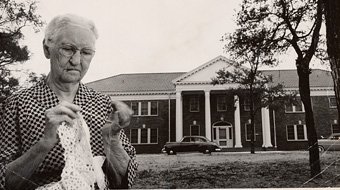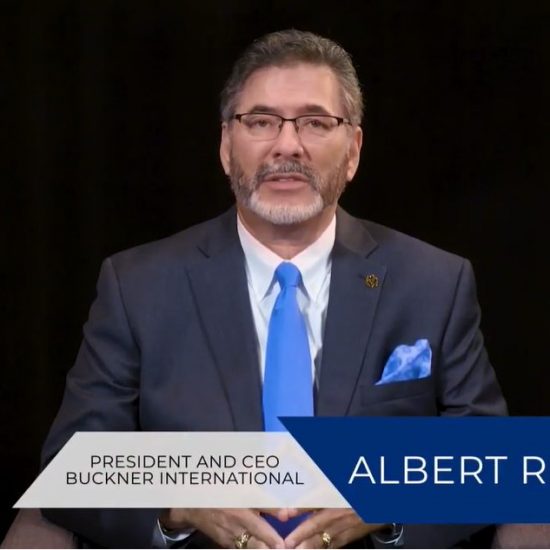DALLAS—Residents of the Mary E. Trew Home at Buckner Retirement Village in East Dallas and their families learned in mid-October the facility will close Dec. 1 because the facility fails to meet state regulations.

Rosa Bailey, age 85, was among the first residents when the Trew Home at Buckner Retirement Village opened its doors 57 years ago. The facility will close Dec. 1. (BUCKNER FILE PHOTO)
|
The closure will affect 51 residents living in the assisted-living, memory-care and congregate-living apartments, as well as 48 employees. Congregate-living represents an intermediate step between assisted-living and independent-living facilities. Independent-living residences will remain open and available for occupancy.
"We care very deeply about our residents and employees," said Charlie Wilson, senior vice president for Buckner Retirement Services. "This was a very hard decision to make but one that was unavoidable. We will do everything we can to provide assistance for our families to find a new home in the coming weeks."
Buckner initially announced the closing date as Nov. 9, but later extended it until Dec. 1. The move needed to happen quickly because of state requirements for the memory-care building, which would require costly measures and rapid implementation to continue operations fully through the end of the year, Wilson said.
Buckner Retirement Services had received waivers from the state 10 years because even though the building lacked the required fire sprinklers, its concrete construction and fire-safety plan had been deemed adequate safeguards.
"We were able to extend the life of the Trew Home through waivers received from the state, ensuring a safe and secure environment for those who we served over the past 10 years," said Albert Reyes, president of Buckner International.
Buckner needs to serve as many senior adults as possible and to exercise responsible stewardship of its resources, he explained.
"A stewardship decision was made over a decade ago to continue providing ministry to our residents without investing additional resources, with the understanding that we would develop a renovation plan for the entire campus like we've done in other places," he said.
Buckner has worked closely with the state on the compliance issue for years, he added, and the agency fully expected to continue receiving waivers.
"The state of Texas recently decided that facilities like the Trew Home can no longer be operated without installing sprinkler systems. In other words, waivers would be denied in the future and compliance to state regulations was mandated. The sense of urgency is a response to state requirements," Reyes said.
"As soon as we were notified that negotiations for a waiver would not take place, we notified our residents and families of our decision to close the building. We also hosted two meetings for families and residents to give them first-hand information about our plans."
However, some residents' families questioned why Buckner continued to accept new residents without notifying them about the facility's failure to meet state regulations, and they criticized the agency's unwillingness to spend the required $500,000 to bring the building into compliance.
Brad Riza, associate director of chaplaincy relations with the Baptist General Convention of Texas, moved to Buckner Retirement Village about a year ago, soon after placing his 89-year-old parents in the Trew Home, about 50 yards from his front door.
"When I placed my parents at Buckner, I was promised, 'You have found a home for your parents, and we will care for them until their dying breath.' Now, a year later, they are kicking everybody to the curb," he said. "Ministry has been thrown under the bus by the bean-counters. … Buckner has lost sight of its mission. They have lost their way."
Barbara Potter moved her mother-in-law to the Buckner facility 11 months ago, and she was stunned by the Oct. 12 announcement about the Trew Home's closing.
"We felt betrayed," she said. Potter, a facilities manager with GuideStone Financial Resources, questioned whether Buckner had explored other options—such as appealing to Texas Baptists for financial assistance—before deciding to close the Trew Home.
Buckner has developed a 10-year strategic plan for its seven campuses around the state, Reyes explained.
"Fundraising to repair a declining campus is not part of the plan," he said. "We believe the seniors we serve deserve the highest quality service possible. Redeveloping the Dallas campus through enhancement, improvement and new facilities is the path we've chosen to provide high-quality service to seniors of all economic levels while also expanding our ability to serve many more seniors than we are currently serving."
Unexpected changes in terms of the state denying waivers forced Buckner to move more quickly than the agency wanted, Reyes explained.
"In places like Austin and Houston, we closed down outdated facilities, asked residents to live off-campus, rebuilt new facilities and then invited them back to a new and improved campus, while also expanding our capacity to serve many more residents," he said.
"The difficulty in the Dallas repositioning is that we are making these changes in response to external expectations placed on us by the state. In the best-case scenario, we would have delayed this inevitable transition and provided much more time for seniors to make transitions from the campus to enable razing and reconstruction to take place. We planned to build new facilities and move residents without displacing any."
Buckner officials announced Oct. 14 the agency would provide displaced residents up to $2,000 reimbursement for moving expenses, deposit for a new place to live and first month's rent.
Buckner also will waive rent for Trew Home residents for November, refund security deposits and prorate rent for October for days any resident no longer lives at the Trew Home.
The agency pledged flexibility to allow additional time for residents to move on a case-by-case basis and offered six months ElderCare Assistance for residents who are receiving assistance at Buckner.
Buckner is working with employees to find new opportunities, including reassignment within Buckner and outside employment, and it will offer a job fair in the near future.
In its announcement, Buckner also promised "assistance with locating a new community to best meet the needs of the resident."
Some residents' families noted comparable facilities are considerably more expensive than Buckner, and they expressed concern that the staff at other agencies would not provide the kind of compassionate Christian concern their family members had received at the Trew Home.
Riza described the staff as "angels," and Potter said she was "heartbroken" her mother-in-law no longer will receive the spiritually grounded care the staff offered at Buckner.
"I don't think we will find a place where the staff will pray for her and be concerned about her as a person," Potter said. "I'm afraid anywhere else, for the staff it will just be a job and not a ministry."
Reyes acknowledged the difficulty the closing of the Trew Home causes residents and their families, but he emphasized the necessity of the decision in light of Buckner's overall mission.
"For over 132 years, we've provided a Christ-centered ministry to vulnerable children, seniors and their families. We have been able to persevere through the years because we have not been afraid to change and lead the way toward the future through innovation. Our willingness to change is a hallmark of Buckner's heritage," he said.
"At the same time, we realize that change is not without grief, loss, pain and discomfort. We've taken great care in providing transition plans and support to each of our residents and staff. And we have made a commitment to continue to provide high-quality service to seniors so they can experience life with pride and dignity. This remains our passion, mission and vision."


